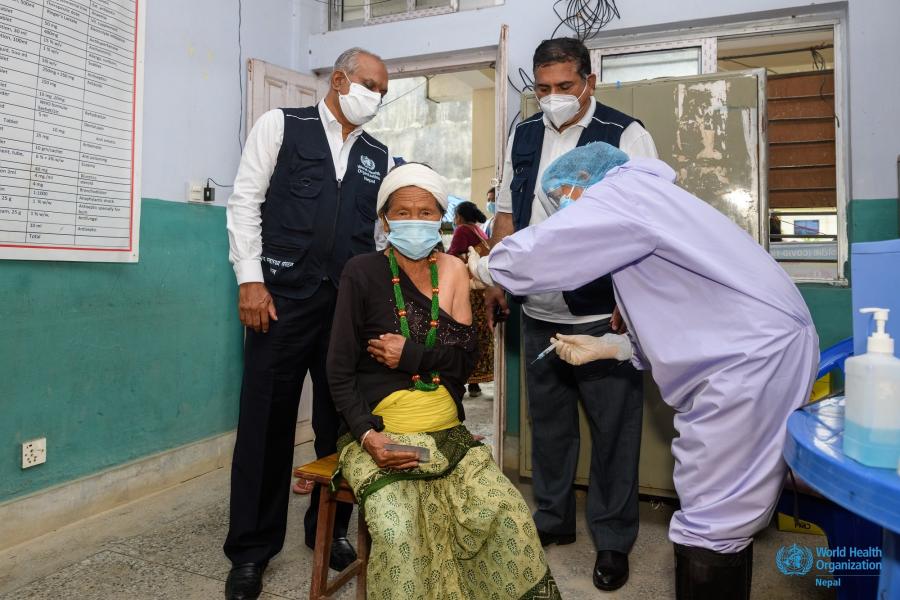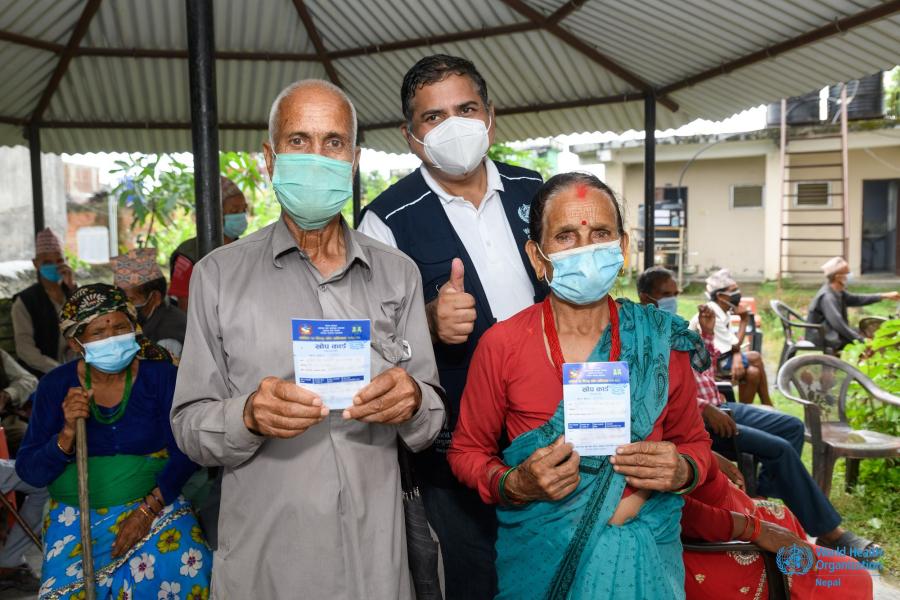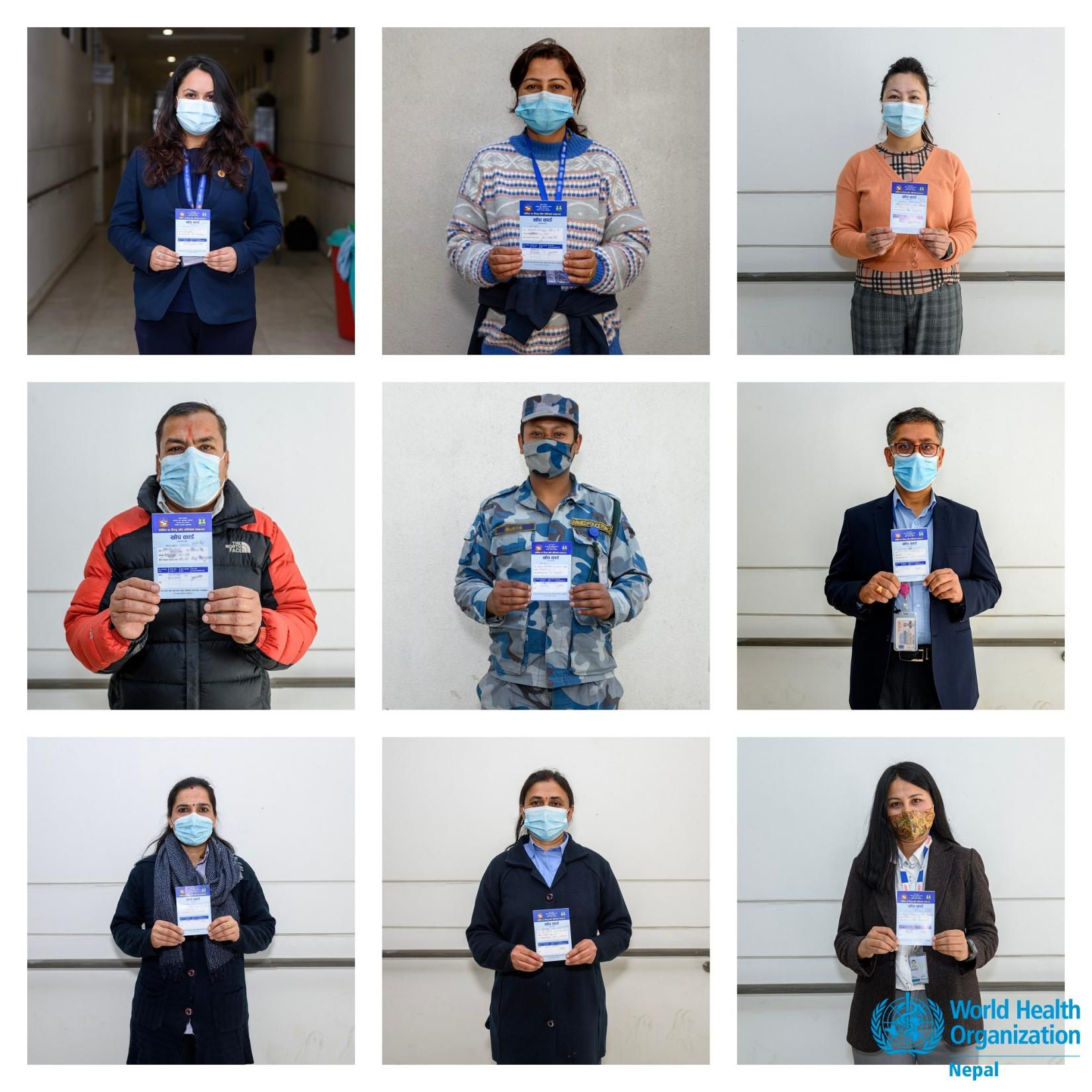40% of Nepal’s total population now fully vaccinated against COVID-19
Nepal has fully vaccinated 40% of its total population of nearly 31 million against COVID-19 as of 16 January 2022.
This coverage milestone puts the country on track for meeting further global vaccination targets set by the World Health Organization.
In May 2021, WHO Director-General, Dr Tedros Adhanom Ghebreyesus, set three global vaccination targets: 10% inoculation of the population of every country by September, 40% by the end of 2021, and 70% by mid-2022.

Nearly 28 million doses of COVID-19 vaccines have been safely administered in Nepal till date; achieving 52% first dose coverage and 40% second dose or full vaccination coverage among the total population. Similarly, the first dose and second dose coverage for the 18 and above target group is 71% and 61% respectively. COVID-19 vaccination for all adolescents in the 12-17 years age group has also started recently in 60 out of 77 districts. The campaign will be expanded to the remaining districts soon.
“Nepal has been able to achieve this feat due to high political and financial commitment from the Government of Nepal. The country’s prior successful experience with running large-scale immunization programs also bolstered the rapid roll out of the COVID-19 vaccination campaign. Credit also goes to the dedicated health workers who have toiled hard during challenging times and have battled difficult terrain to ensure people living in even the most remote areas of the country have access to COVID-19 vaccines,” Dr Vinod Bura, Team Lead of Immunization Preventable Diseases Programme (IPD) at WHO, Country Office for Nepal, said.

Nepal launched the COVID-19 vaccination campaign on 27 January 2021. In the first phase of the rollout, vaccination was provided to health and front-line workers as per the National Deployment and Vaccination Plan (NDVP) developed with technical support from WHO, Country Office for Nepal, and other partners. Following this, people over the age of 65 were vaccinated. Nepal followed the WHO SAGE prioritization roadmap vaccinating the most high-risk and vulnerable groups at first, including refugees, prisoners, differently abled persons, as well as the population in geographically hard-to-reach areas.
WHO has provided technical support for Nepal’s COVID-19 vaccination program and advised the Ministry of Health and Population (MoHP) on immunization-related policies and strategies to ensure vaccine delivery with safety, quality, and efficacy. Additionally, WHO Country Office for Nepal served as a technical secretariat for the National Immunization Advisory Committee which guides and supports the overall immunization programme, including routine immunization, across the country. At the field level, WHO’s surveillance medical officers have supported the government in training, microplanning workshops, monitoring, and for surveillance of vaccine safety.

“Although we faced some challenges due to shortage of supplies mid-campaign, we have now been able to secure an adequate number of vaccine doses for the targeted population. Our focus is now on making vaccines accessible to those on the margins. We want to speed up vaccination efforts and reach the target of fully vaccinating the majority of the population in the coming months,” Dr Bibek Kumar Lal, Head of Family Welfare Division under Department of Health Services, said.
Nepal has received 8,420,600 doses as part of COVAX-AMC, 8,569,120 as COVAX dose-sharing. Nepal has also procured 5,935,400 doses through COVAX cost-sharing mechanism.

“With this achievement, Nepal is protecting more people against morbidity and mortality due to COVID-19. It means more lives will eventually be saved because of increased vaccination coverage. WHO is committed to supporting the Government of Nepal in attaining both its national goal for COVID-19 vaccination and meeting global targets,” said Dr. Rajesh Sambhajirao Pandav, WHO Representative to Nepal.
The Government of Nepal aims to fully vaccinate 100% of those above 18 years target group by mid-April 2022 and has outlined some key strategies in its National Deployment and Vaccination Plan for COVID-19 Vaccine, in order to attain this goal:
- Increase COVID-19 vaccination session sites to mirror at least the total number of routine immunization session sites,
- Integration of COVID-19 vaccination delivery with routine immunization sessions (where feasible and necessary),
- Continuous operation of COVID-19 vaccination session sites at big/tertiary hospitals, medical schools, and points/places with high mobility at urban and densely populated areas,
- Appointment of COVID-19 vaccination ambassadors to increase vaccine confidence in public,
- Collaboration with medical councils, societies, associations, and professional bodies for advocacy of medical provider vaccine standardization (status check for COVID-19 vaccination as a standard medical practice),
- Proactive use of mass media and social media for spreading awareness,
- Improved reporting and recording of vaccination data,
- Advocate for and encourage employers, educational institutions, faith-based organizations, service providers, societies, associations, businesses, corporate houses, etc., to check vaccination status of its staff and members, and refer for vaccination if unvaccinated.

